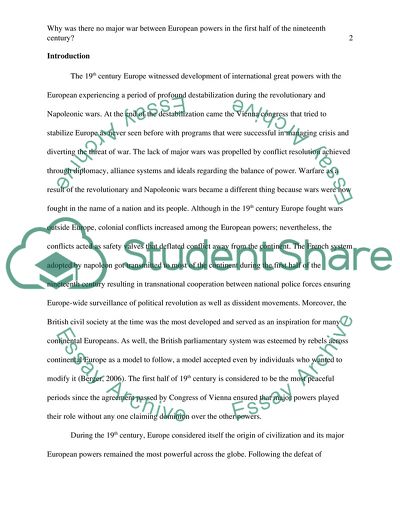Cite this document
(Why Was There No Major War between European Powers in the 19th Century Literature review Example | Topics and Well Written Essays - 2000 words, n.d.)
Why Was There No Major War between European Powers in the 19th Century Literature review Example | Topics and Well Written Essays - 2000 words. https://studentshare.org/history/1810161-why-was-there-no-major-war-between-european-powers-in-the-first-half-of-the-nineteenth-century
Why Was There No Major War between European Powers in the 19th Century Literature review Example | Topics and Well Written Essays - 2000 words. https://studentshare.org/history/1810161-why-was-there-no-major-war-between-european-powers-in-the-first-half-of-the-nineteenth-century
(Why Was There No Major War Between European Powers in the 19th Century Literature Review Example | Topics and Well Written Essays - 2000 Words)
Why Was There No Major War Between European Powers in the 19th Century Literature Review Example | Topics and Well Written Essays - 2000 Words. https://studentshare.org/history/1810161-why-was-there-no-major-war-between-european-powers-in-the-first-half-of-the-nineteenth-century.
Why Was There No Major War Between European Powers in the 19th Century Literature Review Example | Topics and Well Written Essays - 2000 Words. https://studentshare.org/history/1810161-why-was-there-no-major-war-between-european-powers-in-the-first-half-of-the-nineteenth-century.
“Why Was There No Major War Between European Powers in the 19th Century Literature Review Example | Topics and Well Written Essays - 2000 Words”. https://studentshare.org/history/1810161-why-was-there-no-major-war-between-european-powers-in-the-first-half-of-the-nineteenth-century.


